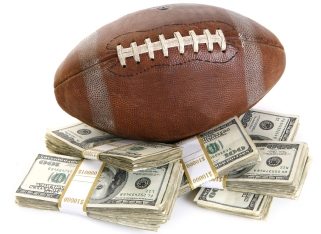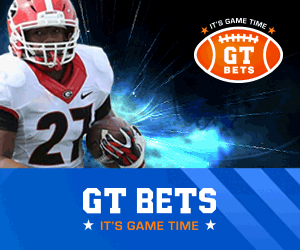NFL’s Fight To Prevent Legal Sports Betting Raises Some Questions
Last Updated: August 13th, 2009 byGet A 100% Sportsbook Bonus @ JustBet Courtesy of Bankroll Sports!
New JustBet Players Only: Must Mention Bankroll Sports at JustBet & Use This Link!
(Must Use Above Links – $100 Min. / $500 Max. – 50% Additional Bonus For Deposits Over $500)
The National Football League, along with the NCAA and the other professional sports leagues in the United States, have filed suit against the state of Delaware (on July 24, 2009) to prevent legal sports betting from taking place. The state of Delaware passed a law (on May 12, 2009) which gives the state  the right to allow and accept legal sports wagers. The newly passed law would, in-turn, make Delaware the 4th state in the U.S. to allow legal wagering on major sporting events. However, the NFL has led other sports organizations in legal battles opposing the state of Delaware’s legislation. The NFL claims that sports betting “would irreparably harm professional and amateur sports by fostering suspicion and skepticism that individual plays and final scores of games may have been influenced by factors other than honest athletic competition.”
the right to allow and accept legal sports wagers. The newly passed law would, in-turn, make Delaware the 4th state in the U.S. to allow legal wagering on major sporting events. However, the NFL has led other sports organizations in legal battles opposing the state of Delaware’s legislation. The NFL claims that sports betting “would irreparably harm professional and amateur sports by fostering suspicion and skepticism that individual plays and final scores of games may have been influenced by factors other than honest athletic competition.”
These actions from the NFL, and the great lengths the league has gone in opposing this new law has escalated a new nationwide debate amongst sports bettors and sports fans alike. Many fans and discerning voices have questioned why the NFL would spend millions of dollars tackling an issue as large as sports betting. After all, most would agree that preventing football betting would seriously jeopardize the NFL’s popularity. Other sports writers and fellow bloggers across the web have voiced their displeasure in the NFL’s actions, stating that the league’s actions are extremely hypocritical, and that the true motives behind the NFL’s fight are being concealed from the public.
The NFL has long been the leader of major sports in the United States. However, their firm stand opposing legal sports betting has produced a lot of mixed emotions. Most people would question why the league would contest the sports betting industry when it promotes so much attention to the NFL. The NFL states that the intentions behind their actions are to keep illegal favoritism out of pro football. However, their stance is a completely unfair assumption to connect that type of illegal activity with the sports betting industry as a whole. Wouldn’t legalization and more regulation make it easier to spot the cheats and scandals in their game? One would think that a computerized system taking bets would be more likely to notice a fix or irregular betting patterns then many illegal bookies. Perhaps the National Football League is worried that some of the gambling issues that have risen in sports like baseball and basketball will carry over into the NFL. Over the past few years there have been cases where players, coaches, and referees have wagered on sports, meaning their actions may have threatened the true outcome of the game. If that were to happen in professional football, it would have a much bigger impact on the sport. However those instances, where “unfair favoritism” has been questioned in sports, have been very rare occurrences; Most of those instances were related to illegal sports betting operations rather then a legal and regulated type of sports betting.
The NFL’s fight against legal and regulated sports betting also shows less faith in the league’s own governing body and the people that are hired to make sure the game is “on the up and up.” Does the NFL really think that the referees they hire would show favoritism in any relation to sports betting? If a referee or any other type of league official were subject to some type of influential favoritism, then perhaps they should have never been given that opportunity or job in the first place. Instead of spending millions on legal teams to fight online gambling, perhaps the league could put their money toward hiring and testing full-time officials; refs that work all year round, which in turn would improve the overall quality of the game. If the NFL wants to spend millions cleaning up the “integrity” of the league, perhaps they could put that money toward hiring better referees and actually improving the screening and testing that these officials are put to. I am sure most would agree that there are more productive ways to spend millions of dollars (toward improving the quality and the integrity of the sport) then to spend it on bunch of lawyers. It makes you wonder who is really making these decisions.
NFL may be in a losing battle here as they are contesting not only an industry that allies their own popularity, but they are also taking on issues like personal rights. Most people would agree, whether you approve or oppose legalized sports betting, that any type of gambling is, and should continue to be a personal right that one can participate in by choice. Along with personal rights, the NFL is trying to prevent policy that could generate billions in revenue for the states, which in turn would help a dire economy; taking money away from illegal betting operations, turning them into regulated and controlled business enterprises. Again, most would also agree that legal and regulated businesses are much less open to corruption then illegal bookmaking operations, often run by the mob and criminal enterprises. Does the NFL really have the power and money to prevent an industry from legally flourishing, which in turn could create millions of jobs and bring in billions of revenue for state and federal governments?
People must abide by governing laws, but the National Football League is suggesting that even legal types of sports betting are wrongful by nature and will negatively impact all sports by producing the possibility of “unfair competition”. However, many issues of possible “corruption” and “unfair competition” are even questioned today, in NFL games over the past few years; instances where favoritism was perhaps being shown to teams with larger fan bases (or teams who are bet on less with bookmakers). Many people have raised their own “fair competition” issues following games where there public is clearly betting on one side and the opposite side seems to somehow cover the spread on what fans would characterize as “unfair” and “skeptical” calls by officials.
An excellent example of this would be in the 2008 regular season Chargers vs. Steelers game (on 11/16/08). In this game, a last second, and 100% meaningless (to the winner of the game), touchdown by the Steelers would have produced a win for all the people who bet on Pittsburgh (-4 points) that day. This touchdown (which would have put Pittsburgh up by 8) was removed and taken off the board without any explanation by the officials (video). Immediately after the game, the league stated that this was a “mistake” by the officials. The “removed touchdown mistake” ended up making all Steelers bets losses. The Steelers just happened to be the most commonly bet NFL wager of the day on that Sunday (with over 10 million dollars in action on them). As a result, this “removed touchdown mistake” (which was discussed for 15 minutes by the officials with no time on the clock) ended up generating tens of millions of dollars in gambling profits for the Vegas casinos and illegal bookmakers. This “mistake”, for some reason, took the game’s officials fifteen minutes discuss and eventually make (while zero seconds were left on the clock). Despite the fact that the 15 minute discussion HAD NO BEARING ON WHO WOULD WIN THE GAME (only the cover was decided by the call), they still spent considerable time discussing it (I wonder why). This “mistake” sure did work out well for Vegas and illegal bookmaking operators. Now, after seeing this, I am supposed to believe the NFL when they tell us that a completely regulated (and 100% legal) form of sports betting in Delaware would actually increase skepticism by fans; and at the same time, also increase fixed games by officials. Personally, I find that to be entirely unreasonable speculation (and quite frankly, completely hypocritical). That game was clear evidence that the referees are 100% aware of the game’s spread.
Again, the NFL (and many other sports leagues in this fight) could take the money (and the time) that they are currently putting behind this fight (to prevent legal betting), and spend it on increasing regulation in their own sport, in effort to prevent cheats, sports betting scandals, and “mistakes” by their referees. But, an overall opposition to the legalization of sports betting and firm stance against all types of betting seems to baffle the NFL’s fans; whom have knowledge on the subject. Why would the NFL want to prevent this?
For the most part, the NFL has done a good job throughout their history at keeping instances of cheating and “unfair competition” from evolving. It is very unlikely that a legal and controlled sports betting industry could change those values; not to mention how the NFL is villainizing their fans who actively participate in legal betting, by suggesting that all types of sports gambling are wrongful by nature. This article is not an attempt to debate whether or not sports betting (in general) is morally right or wrong, but new legalization laws shouldn’t give the NFL the right to have their own preference towards the gambling industry and state law. It’s just not their decision to make.
This particular story has grown into a much bigger issue and debate outside of the state of Delaware. I have to ask…If the NFL opposes the Delaware sports betting legislation, does this mean they also oppose all other states that allow legal sports betting? Why don’t they feel the need to oppose the sports betting laws in Las Vegas? Why release injury reports a week before the game to the general public? If sports betting as a whole were to cease existence as of today, the National Football League would feel a tremendous impact. The NFL television ratings would take catastrophic drops. Think of all the sports bettors that tune in every Sunday to games after making a wager or filling a parlay card in hopes to make a few bucks. One thing sports betting does provide, is an uncontested excitement to the games, whether the wager is large or small. Those who appreciate that very excitement would not have nearly as much interest in the NFL or sports as a whole. However, I believe the real issue here lies in the NFL’s firm stance to prevent a person from making their own choice. The National Football League should not have the right to insist that those who participate in sports betting are doing wrong.
For any free-thinker and general skeptic, this entire issue and debate has to raise other questions. Some of the questions one might ask include;
Are there perhaps other motivations behind the NFL’s fight to stop legal sports betting in the United States?
Why would the NFL care if Delaware legalizes betting similar to the type of sports wagering that goes on in Las Vegas and other legal venues? Why don’t they take Nevada to court?
If the NFL is so extremely anti-gambling, why doesn’t the league assist the authorities in cracking down on illegal bookmaking operations.
Why doesn’t the NFL put all the money they are using on lawyers into increasing the league’s own conduct and integrity (if that’s what they care so much about)?
If you get answers to these questions from the league, please let me know. The truth is, there are so many much bigger issues that the NFL could (and should) be focusing their attention on, rather than blurring the lines of such a personal issue that would most likely have no impact on the actual game.
Perhaps one of their focuses could be an actual effort to keep their athletes safe off the field (and away from criminal activity). In the last year, the NFL has lost two star players (in Sean Taylor and the retired Steve McNair) from murders. Additionally, NFL players are constantly filling up newspaper headlines in reference to criminal activity. Meanwhile, (instead of fixing the game’s real problems) the NFL is trying to control their fans (preventing them from placing a $100 bet on the game) when at the same time, the league can’t even control their own players. The NFL is actually attempting to tackle a legislative issue in order to prevent their fans from participating in a safe, legal, and what would be, a completly regulated activity. At the same time, they can’t even keep their own employees from criminal, unlawful, and harmful behavior.
Is it really worth the time and money to go to a legal war with an industry that has helped make the NFL the leading sports association in the world; particularly when the league has so many other problems that need addressing? If you ask me, it flat out does not make any sense at all.
What do you think? Let the Bankroll Sports staff and other NFL fans aware of your thoughts on this major issue by leaving your comments below…
Comment on This NFL Football Article (Using Your Facebook) Below





